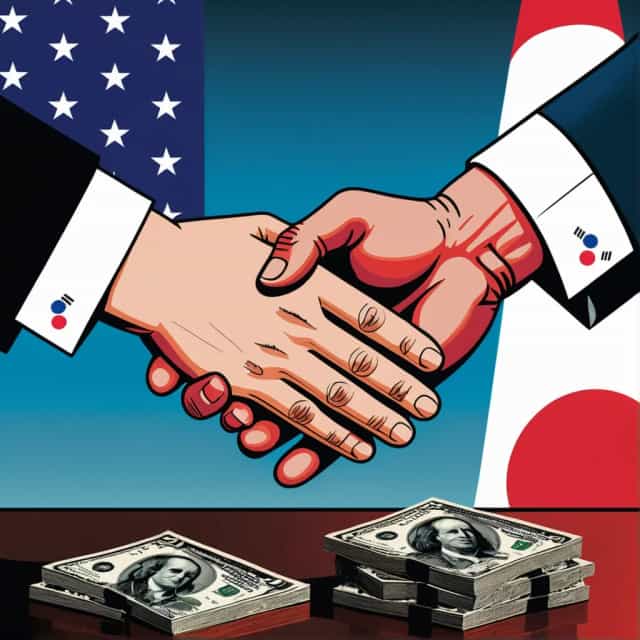
Image source: Block Media
Binance Reenters the South Korean Market with Regulatory Approval of Gopax Acquisition
Binance, the world’s largest cryptocurrency exchange, has officially reentered the South Korean market after more than two years of absence. This strategic comeback follows regulatory approval from the Financial Services Commission (FSC) and the Financial Intelligence Unit (FIU) for the acquisition of a majority stake in Gopax, a South Korean crypto trading platform. The successful conclusion of this process marks a major milestone for Binance, enabling the exchange to operate a legal won-denominated trading market within South Korea.
On October 16, it was reported that the FIU finalized the shareholder change notice for Gopax, removing the regulatory roadblocks that had limited Binance's involvement in management activities despite its acquisition of a controlling 72.26% stake earlier in 2023. Binance’s reentry is particularly significant as it sets a precedent for international crypto exchanges entering South Korea via regulatory approval, a first-of-its-kind achievement after Binance KR’s closure in 2020 due to compliance challenges.
This regulatory greenlight comes amidst scrutiny of Binance’s global operations. The company has faced penalties totaling $4.3 billion from U.S. authorities, including lawsuits from the Securities and Exchange Commission (SEC) for alleged violations. The approval by South Korean regulators signals confidence in Binance’s ability to meet local financial standards, which has been further reinforced by Gopax’s compliance with South Korea’s Special Act on Reporting and Use of Specific Financial Transaction Information.
Binance’s Strategic Commitment: Stabilizing Gopax and Protecting Investor Interests
Binance’s renewed entry into South Korea demonstrates a calculated approach to overcoming earlier challenges. Its first attempt in 2019 revolved around acquiring fintech firm BxB and launching Binance KR. However, the venture stalled due to the inability to secure real-name bank accounts, prompting the company to withdraw from the market in less than a year.
This time, Binance shifted its strategy toward acquiring Gopax, an established exchange with local regulatory registration. At the time of the acquisition, Gopax was dealing with significant financial distress stemming from the bankruptcy of its lending service operator, Genesis Global Capital. This crisis had resulted in approximately hundreds of billions of won in frozen customer deposits through Gopax’s lending platform, "Gofi."
To ensure trust and stability, Binance pledged to inject 1 trillion won (approximately $750 million) to cover unpaid deposits, making investor protection a key priority. With regulatory barriers now lifted, Binance can fully integrate its operations with Gopax, offering won-denominated trading services to South Korean customers.
Binance’s Regional Head for Asia, Europe, and the Middle East, Richard Teng, has reiterated the company’s commitment to prioritizing user protection and ensuring unpaid liabilities are resolved for Gofi users. Additionally, Binance safeguards customer assets globally through its Secure Asset Fund for Users (SAFU), currently valued at $1 billion, providing an extra layer of security for client funds during emergencies.
Impact on South Korea’s Crypto Exchange Market and Competitive Dynamics
Binance’s comeback is poised to significantly disrupt the competitive landscape of South Korea’s crypto exchange industry. The market is currently dominated by local leader Upbit, which holds more than 60% of the market share, followed closely by Bithumb and Coinone. With Binance’s expansive global expertise and resources entering the local sphere, competition among exchanges is expected to intensify, driving innovation in fee structures, token listings, and customer services.
The Gopax platform is anticipated to transform into a hybrid Korean-global exchange leveraging Binance’s vast trading infrastructure and brand authority. Binance, which handles annual trading volumes of approximately $7.35 trillion (about 1.44 quintillion won), is likely to bring global liquidity and advanced technologies to the domestic market, challenging the existing monopoly held by Upbit and its rivals.
Financial experts have dubbed this regulatory approval a turning point, highlighting its significance as the first formal pathway for a foreign cryptocurrency exchange to legally operate in South Korea. This development is also expected to influence the broader regulatory framework for digital assets in the region, serving as a benchmark for future foreign entrants and the evolution of South Korea’s crypto policies.
Conclusion: A New Era for Binance in South Korea
Binance’s reentry into South Korea signifies more than just a business expansion—it marks a new era for the country’s cryptocurrency industry. By successfully navigating stringent local regulations and stepping in with a commitment to investor protection, Binance has set a precedent for global exchanges seeking to enter South Korea’s market.
As Binance begins full-fledged operations through Gopax, the South Korean crypto market is likely to experience more robust competition, potentially reshaping the balance of power. While it remains to be seen how Binance’s presence will influence local players like Upbit and Bithumb, there is no doubt that this move signals a pivotal shift in the country’s digital asset landscape and presents new opportunities for both investors and regulators.










